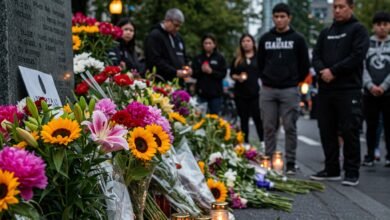The Multifaceted Career of Val Kilmer: A Hollywood Legend

Early Life and Career Beginnings
Val Kilmer was born on December 31, 1959, in Los Angeles, California. He grew up in a modest household, with his father being an aerospace engineer and his mother a homemaker. Kilmer’s family moved frequently during his childhood due to his father’s job, but they eventually settled in the San Fernando Valley. This environment offered a unique blend of creativity and suburban normalcy, laying the groundwork for young Kilmer’s artistic aspirations.
From an early age, Kilmer exhibited a passion for the performing arts. His interest in acting began to flourish during his high school years at Chatsworth High School, where he participated in various theater productions. He quickly gained recognition for his talent and received accolades for his performances. Following high school, Kilmer’s dedication to acting led him to pursue formal training at the Juilliard School in New York City. This institution, known for shaping some of the finest actors in the industry, provided Kilmer with invaluable experience and skills.
At Juilliard, Kilmer developed not only his acting techniques but also his work ethic and character. He was known for his intensity and dedication, qualities that would later define his career in Hollywood. After graduating from Juilliard in 1982, Kilmer returned to Los Angeles, where he embarked on his career in film. His initial foray into the industry included roles in theatrical productions and television movies, which showcased his versatility as an actor. Notable performances in projects like the stage adaptation of “The Macbeth” and appearances in film shorts allowed Kilmer to refine his craft and gain early recognition.
It was his breakthrough role in the comedy film “Real Genius” (1985) that ultimately propelled Kilmer into the spotlight. This success marked the beginning of a multifaceted career, setting the stage for his future iconic roles and cementing his status as a Hollywood legend.
Breakthrough Roles and Hollywood Stardom
Val Kilmer’s ascent to Hollywood stardom can be traced through a series of breakthrough roles that showcased his remarkable talent and versatility as an actor. One of his most notable performances came in the 1986 blockbuster ‘Top Gun,’ where he portrayed the charismatic fighter pilot Iceman. Kilmer’s portrayal not only captivated audiences but also established him as a rising star within the demanding film industry. The film’s immense popularity turned Kilmer into a household name, solidifying his place within the competitive landscape of 1980s cinema.
Following ‘Top Gun,’ Kilmer took on an array of diverse roles, further enhancing his reputation. In 1991, he starred as Jim Morrison in ‘The Doors,’ a biographical film that explored the life of the infamous rock musician. Kilmer’s transformation into Morrison was profound; he not only studied the musician’s mannerisms and vocal patterns but also conveyed the complexities of the troubled artist with remarkable authenticity. This role demonstrated Kilmer’s ability to fully immerse himself in his characters, reflecting his commitment to the art of acting and adding depth to his performances.
Another significant film in Kilmer’s career was ‘Tombstone’ (1993), where he played the legendary gunfighter Doc Holliday. His magnetic performance delivered wit and depth to the character, earning him critical acclaim and an enduring legacy in the Western genre. Kilmer’s portrayal of Holliday was not only charismatic but peppered with a captivating blend of vulnerability and strength, qualities that endeared him to audiences worldwide. This film represented a pivotal moment where Kilmer became one of the most sought-after leading men in the 1990s, marking a significant chapter in his multifaceted career.
Challenges and Personal Struggles
Val Kilmer’s career has been marked not only by his remarkable talent but also by significant challenges that have tested his resilience. Throughout his journey as an actor, Kilmer has faced numerous personal struggles that have shaped not only his professional life but also his outlook on existence. One of the most defining moments of his life was his battle with throat cancer, a diagnosis that emerged in the mid-2010s and profoundly affected his health and voice, both of which are vital to his acting career.
The diagnosis came as a shock, altering the trajectory of his life and work. Kilmer, known for his charismatic performances and distinct vocal delivery, found himself grappling with the reality of a serious illness that posed substantial risks to his livelihood. The physical challenges that accompanied his treatment were daunting; his condition limited his ability to communicate effectively, which is fundamental for any performing artist. This turning point forced Kilmer to confront not just the battle for his health, but also its implications on his identity as an actor.
Despite these formidable challenges, Kilmer’s story is also one of resilience. He demonstrated a remarkable determination to overcome adversity, cherishing the support he received from friends, family, and fans throughout his health journey. This phase of his life imparted invaluable lessons about perseverance and the importance of embracing one’s vulnerabilities. Through candid reflections, Kilmer illuminated how this difficult chapter allowed him to gain a deeper understanding of life and art. His experience instilled in him a renewed passion for acting and storytelling, proving that even in moments of despair, creativity can thrive. As he continues to navigate his recovery, Kilmer’s journey serves as a testament to human strength and the indomitable spirit of those who face life’s toughest battles.
Recent Projects and Legacy
Val Kilmer’s recent endeavors have exhibited his resilience and passion for the craft of acting, particularly in light of significant health challenges that he has faced. His return to the screen has been marked by the documentary film Val, which premiered in 2021. This heartfelt project, directed by Leo Scott and Ting Poo, offers an intimate glimpse into Kilmer’s extraordinary life, showcasing his work and personal experiences through a combination of archival footage and contemporary reflections. Val serves not only as a chronicle of his illustrious career but also as a poignant reminder of his perseverance and spirit as he continues to navigate the complexities of his health.
In addition to the documentary, Kilmer’s involvement in the film industry remains evident through his role in the highly anticipated sequel to the iconic movie Top Gun. In Top Gun: Maverick, he reprises his beloved character, Iceman, thus reaffirming his lasting impact on popular culture. This return to a character that resonated with audiences decades ago is a testimony to his enduring legacy as a talented actor. Kilmer’s ability to evoke nostalgia while also confronting his present circumstances speaks volumes about his skill and depth as an artist.
The influence of Val Kilmer on Hollywood extends beyond his performances. His dedication to the craft has inspired countless actors and filmmakers who seek to tell genuine stories. By candidly sharing his journey through Val, he encourages future generations to embrace vulnerability and authenticity in their work. Kilmer’s unique contributions to cinema, marked by memorable performances and a willingness to challenge stereotypes, have solidified his status as a multifaceted artist. As the film industry continues to evolve, Val Kilmer’s legacy as a Hollywood legend will undoubtedly influence the aspirations of emerging artists and shape the narratives they seek to create.






















